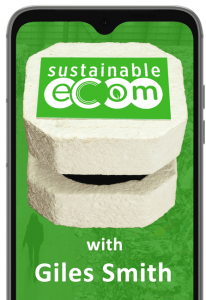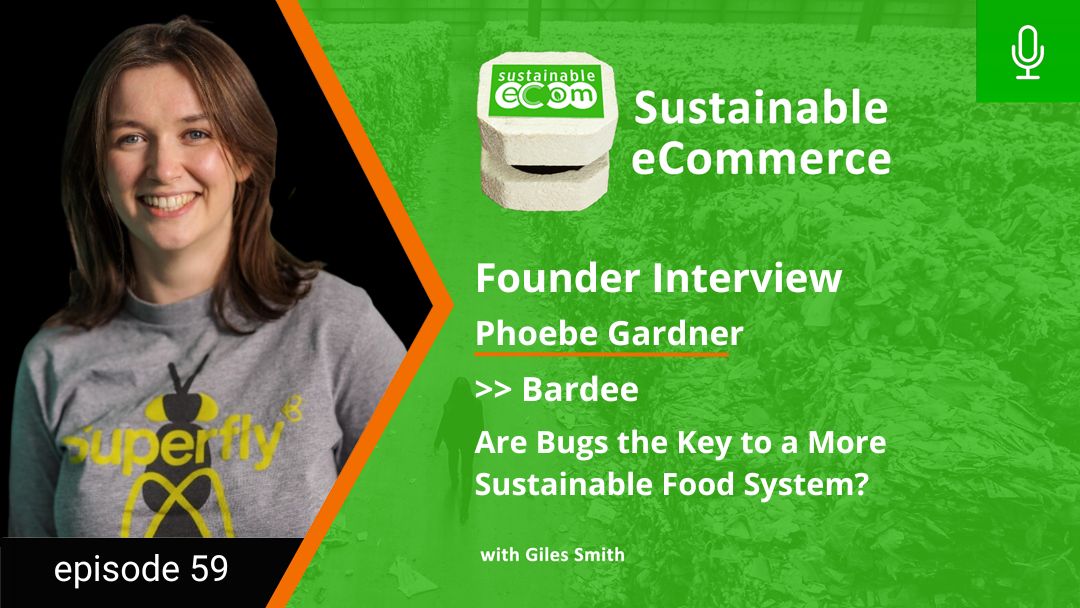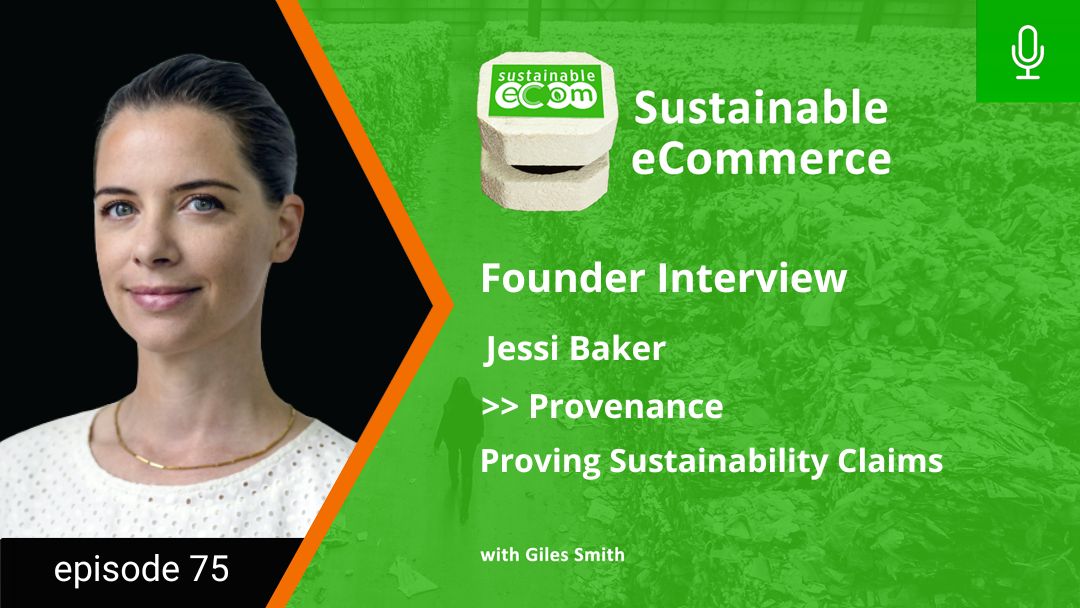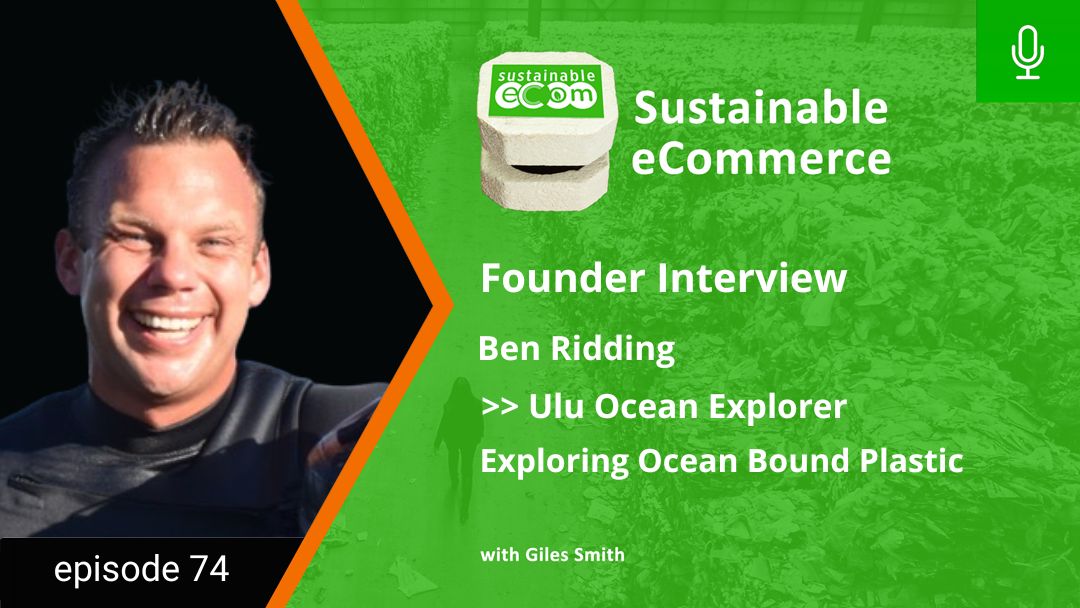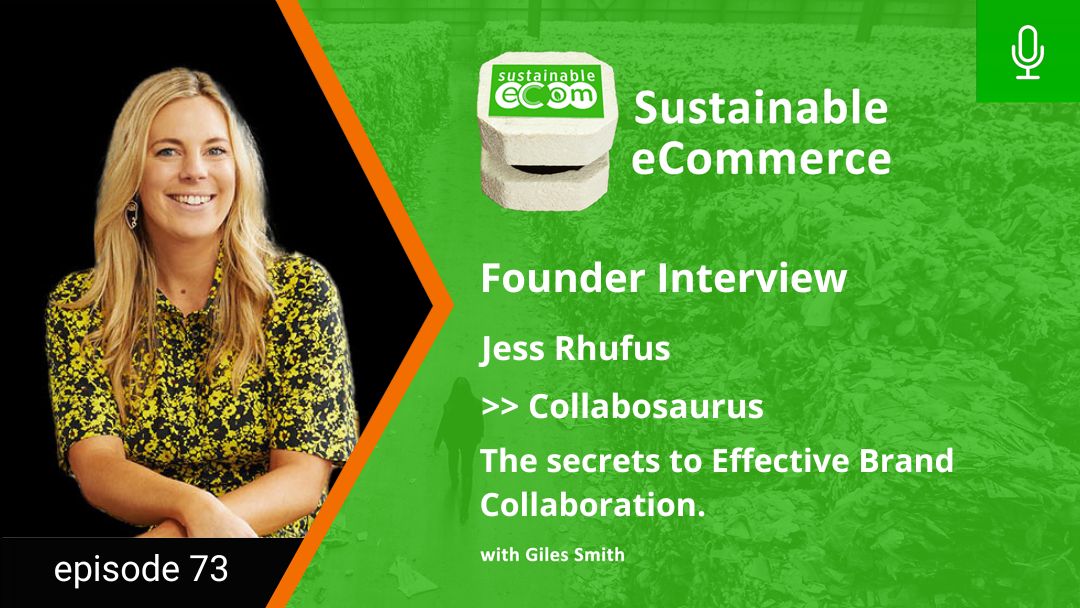EP59 - Sustainable Ecommerce Podcast
You might be forgiven for thinking that I’m becoming a little obsessed with brands that turn waste into value, and you’d be right!
Last week we had Goodcitizens, aiming to Untrash the Planet by turning post consumer plastic into desirable eyewear.
This week we have another incredible Aussie entrepreneur, who’s getting even grubbier (pun very much intended) by using insects to turn food waste into protein and fertiliser.
Phoebe Gardiner is the Co-Founder of Bardee, an AgTech start-up from Melbourne who’s managed in just 3 years to scale operations up to processing 40 tonnes of food waste every single day.
Food waste is one of the biggest contributors to Greenhouse Gas emissions. It’s estimated that every tonne of food waste averted from landfill saves nearly 2 tonnes of emissions.
So quite aside from the alchemy of turning waste into value, Bardee’s operations are already materially contributing to our struggles towards Net Zero. So much so, that they’re the first insect tech project in the world to become a recognised & certified Carbon Offset provider.
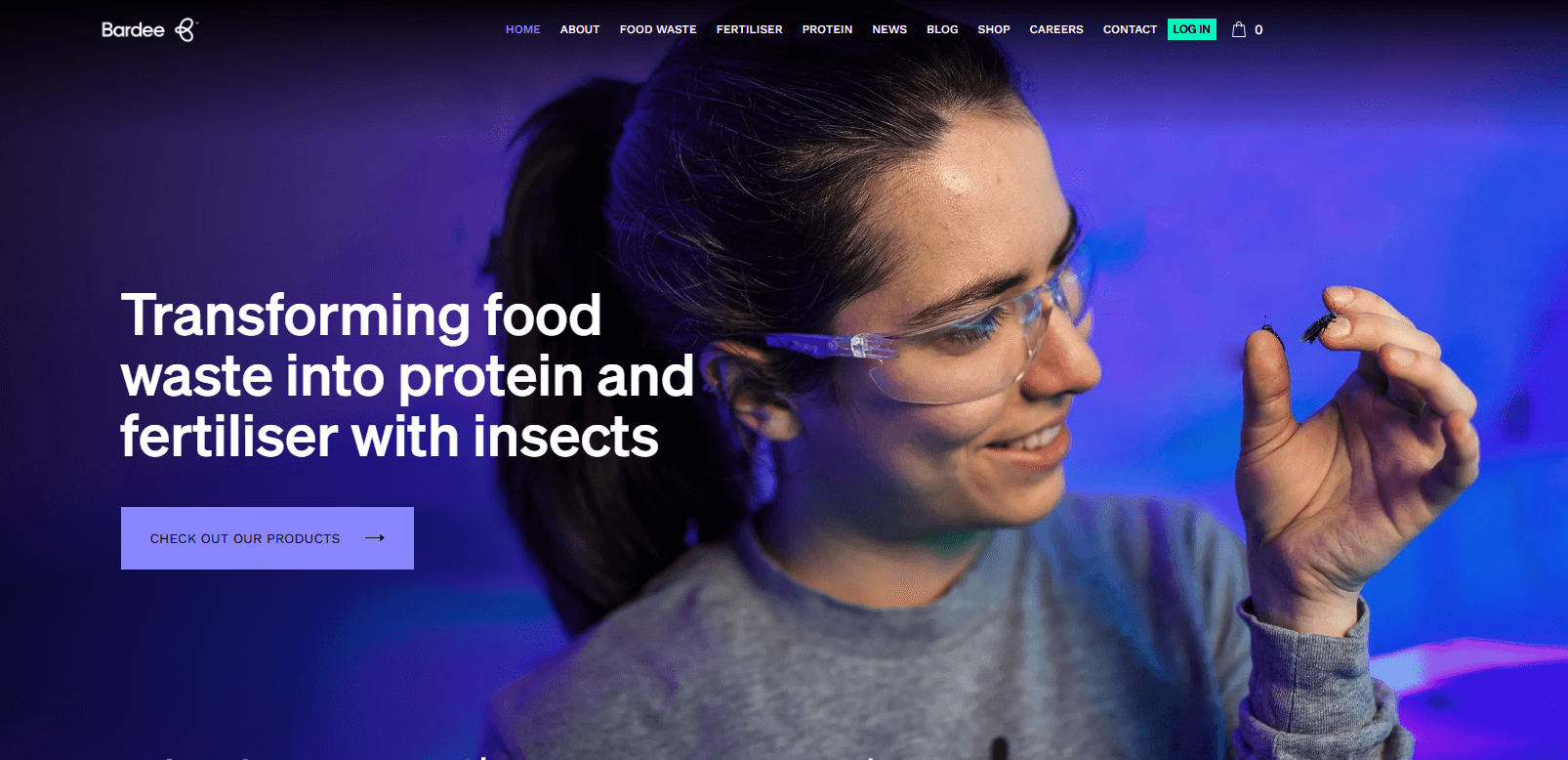
About Phoebe Gardner and Starting Bardee
Phoebe grew up on Melbourne’s Mornington Peninsula before heading to study Architecture at University of Melbourne. Subsequently she worked on large scale infrastructure projects, getting exposure to risk, planning and governance elements. The concept for Bardee originated as a thought experiment while Phoebe and partner Alex Arnold were overseas. Alex studied entomology, specifically breeding soldier flies, and the pair spent time brainstorming how you could build a city-scale facility to house insects and transform a whole city’s waste into valuable products like fertiliser.
The pair were encouraged to take the conceptual idea and explore if it could be realised by being surrounded by the entrepreneurial community in Melbourne, specifically friends and colleagues at the Wade Entrepreneurial centre. They applied for and were awarded with a university grant of $20k to build up a prototype, and using Phoebe’s architectural knowledge were able to create their first 60sqm lab to breed insects and start processing their first batches of food waste.
What does Bardee do?
Bardee Transforms food waste into protein and fertilser using insects. In doing so, they are on a Mission to reshape the global food system.
Food waste is deposited at their facility, where it is fed into a conveyor, imaged and each item dynamically tagged in real-time to attach a nutritional profile. Waste is then blended together to create optimized nutritional mixes for their fly larvae. They also have a breeding facility for the flies, the early-stage larva are then combined with the food waste into a vertical farm.
From there, the insects consume the waste food, growing 3000x in volume and 10,000x in weight within 7 days, and at the same time, producing 1.5X their final weight in ‘fly poo’ known as castings.
The grubs are desiccated and used for protein components for food ingredients & animal feed, and the castings get turned into organic-certified fertiliser.

What type of waste can you process?
Bardee can process essentially all types of food waste, and they process everything they receive. From commercial pre-consumer food scraps, catering food waste, office tower waste to domestic food waste. They work on creating custom blends so that the combine nutritional value for the flies produces the highest quality and most consistent high-grade fertiliser products.
Making consumer-quality fertiliser from fly poo
Bardee’s superfly fertiliser has been seeing tremendous results for over a year in commercial horticulture. The fertiliser mix carries all the fly’s digestive tract microbial colonies but it also includes insect casings, which contain a concentrated set of nutrients that encourage plant defence systems as well as encouraged the onset of fruiting and budding.
Armed with those results they received interest from Bunnings to commercialise the product and make it available to the retail market through the national chain. Converting it from a large-scale application complete with natural variations in texture was challenging. Among many factors, the material itself includes 200X more microbes than the best compost on the market, up to 240 million microbes per gramme! In a very real sense the fertiliser is ‘alive’ and that makes it challenging to convert to consumer product with an extended shelf life.
It took nearly a year to develop the product to be suitable for retail market. Aside from design to make it visually appealing, the packaging needed to protect the fertiliser for indoor and outdoor extremes, keeping the microbes inert but alive ready to be used after an extended period.
It’s a global first for black soldier fly-based fertiliser in a retail store anywhere, and really the first insect-based fertiliser as opposed to a compost, since they can guarantee plant-available nutrients.
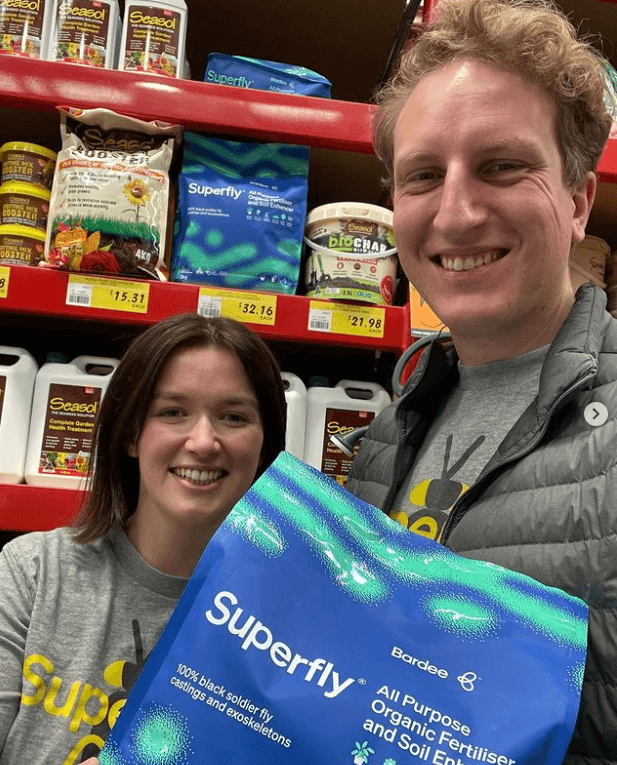
Are you focused more on B2b or B2C
Bardee was founded as B2b – the strategy was to be a bulk branded ingredient supplier, following the model of Intel in computers. Initial launch and sales followed that model where Bardee was an ingredient in other’s brands products.
However, as they saw consumer demand for this rise, without significant uptake from larger brands to meet that demand, they saw an opportunity to commercialise their own retail product brand, Superfly.
Currently, B2B is still the biggest part of the business, but B2C is growing rapidly and will probably overtake it in the near future.

The world’s first insect-tech company to offer carbon credits
In October 2022, Bardee was certified by the Clean Energy Regulator of the Aust Government to produce Carbon Credits. It’s a global first for insect tech, and is now being used as a landmark case study around the world.
What was Bardee’s approach to funding?
After the initial development of the prototype lab, Bardee produced early samples to showcase to potential customers and seek funding to commercialise the operation. An initial VC-backed funding round of $1m was quickly followed by an additional $7M+ in a mix of larger VC funds and angel investors here in Australia. However, since that success, Bardee has seen a significant change in the funding landscape with a huge reduction in fund allocation to early-stage tech and especially female founders. Start-ups seeking funding in 2023 are looking more towards impact and climate-tech funds as well as sources of debt capital.
What’s next for Bardee?
Bardee now has an exciting platform for growth having met or exceeded their goals for quality and insect technology. Their main focus now is on scaling up the demand, building out more products and looking for more ways to engage more people in this new circular food system.
Looking to the future, Phoebe is excited by the prospect of realising their original concept of a mega-factory capable of processing a whole city’s food waste. Falling back on her early days as an architect, that’s still the dream!
Top Takeouts
The funding landscape for sustainability-focused start-ups has shifted significantly in the past 18 months. If your business is close to looking for funding, it’s important to know that the appetite for risk among the larger VC system has changed, and you may need to adjust your sites, your approach and how you’re presenting your business accordingly.
If approaches to seeking growth capital is a topic area of interest to you, hit me up on LinkedIn and let me know, and I’ll see what I can do to pull together some expects on this topic to provide their thoughts.
Specifically on Bardee, I thought it was interesting and instructive to hear the work that needed to go into re-engineering their product to be suitable for a retail placement with Bunnings.
From scientifically proving the efficacy and real field trials data, through to packaging design, and even re-engineering their waste inputs to generate a consistent experience bag to bag for the consumer. Remembering that we’re talking about fly poo, not a tin of paint or a box of breakfast cereal, that was quite eye opening.
Finally, of course if we want to create a healthier planet, we have to have big brands doing the right things. But I’ve always said its the SME brands that are pivotal in helping us get there.
Bardee is a case in point. A little tech start-up from Melbourne is showing the world a way to re-engineer the food system, using insects to turn food waste – that would otherwise be rotting in landfill, into valuable products that can be injected back into the food system AND making a massive impact on reducing carbon emissions at the same time.
If your brand is making an impact and challenging the status quo, then never forget that what you’re doing is a needed and vital part of this whole ecosystem too.





